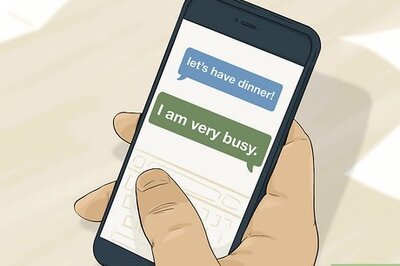
views
- Show your affection verbally by complimenting people, sending them affectionate messages, and encouraging and supporting them.
- Show your affection through action by giving people your undivided attention, doing kind things for them, and giving them small, meaningful gifts.
- Make lists of the types of touch you like and don't like so you can set clear, healthy boundaries with the people you love.
Showing Affection Verbally

Tell the person how you feel about them. You don't need a special occasion to tell someone that you love them or that they're special to you—and it's a great way to show your affection. Sharing your feelings makes people feel all warm and fuzzy inside and builds your emotional connection. You can even mention that although you're uncomfortable with physical affection, that doesn't change how much you love them. For example, you might say, "I know I'm not very affectionate sometimes, but I just want you to know that I like you a lot." You might also say, "Even though I don't like hugs, I love you. Just wanted to let you know!"

Compliment the person when they say or do something you like. Compliments show your appreciation and make the person feel special. Compliments are especially powerful when they're about what someone does rather than how they look because they show that you appreciate them. Here are some phrases you can use to jumpstart your compliments: "I appreciate it when you..." "I was impressed when you..." "It meant so much to me when you..." "You inspire me when you..."

Send the person affectionate messages. Texting or direct messaging through social media platforms are great ways to show affection for someone that don't involve physical touch. You can also add heart-eye or other flirtatious or affectionate emoji so the meaning behind the text doesn't get lost. You might also send them videos or memes that remind you of them, your feelings for them, or your relationship in general. If you're talking to the person on the phone, pay attention and really be engaged in the conversation. Dating expert John Keegan mentions showing affection through things such as "words of encouragement... playful little jokes and teasing... [and] also just directly saying what you like about them."

Write a love letter expressing your feelings. If you enjoy writing and putting your thoughts down on paper, this can be a great way to show affection. Think about what you love about the person, then go into a little detail about each of the things you've thought of. Not only will this be really touching to them but also they'll get to keep it and refer back to it whenever they want. If you're not into writing, you might also draw them a picture, make them a mix tape, or knit them a scarf. All of these are great ways to show how much you care about someone.

Follow up on details about things they tell you. Listen actively and ask the person open-ended questions as they're telling you something. Then, you'll know what's going on in their life and you can ask about it later. This shows that you're really interested in them and care about them. For example, if a friend tells you about a problem they're having with a family member, you might ask them about it the next time you see them. Or if your significant other mentions a short story idea they have, you might ask about their progress on it a week later. If you have a hard time remembering things, there's no shame in setting a reminder on your phone so you'll remember to follow up with them when it's appropriate.

Encourage and support them openly. Show affection by being the person's biggest fan. When you show up for them and are always there to cheer them on, they'll understand just how much you care about them. For example, if your best friend is on a basketball team, you could show affection by going to their games and cheering for them. You might even make a sign with their name on it that you can hold up from the stands.
Showing Affection through Action

Offer the person your undivided attention. When you spend time with someone you love, show affection for them by really listening to them. Make eye contact to show them that, as far as you're concerned, they're the only person who exists. Focusing like this enables the two of you to connect and bond on a deeper emotional level. Dating expert John Keegan notes that "the number one way to show someone that you like them, or that you're interested in them, is to pay attention to them.... [R]eally listen to them, when you're with them, and not be distracted by your phone or extraneous things going on [but] really focused on them."

Do chores for them without being asked. People will know that you love and care about them if you take something off their plate so they have more time to relax and enjoy themselves. Even better if you take on something that you know that person hates to do. For example, if you know that your significant other hates to do the dishes, you might surprise them by doing the dishes before they get home so they don't even have to think about it. Doing small things to make the person's life a little easier will always be appreciated. For example, if it's icy outside and your significant other has to drive to work in the morning, you might set your alarm before theirs so you can go out and scrape their windows and warm up their car for them.

Give them a special gift or token of your affection. Surprising a romantic partner, friend, or family member with a small gift is a great way to show your affection for them. Make sure it's something meaningful that either reminds you of them or is symbolic of your feelings for them. For example, you might pick up an owl keychain for your best friend because owls are their favorite animal. Dating coach John Keegan suggests showing up with something small you know they'd like, such as a box of chocolates, and saying "Hey, before I showed up today, I thought about you. Just a little thing, nothing major, but I thought of you." This doesn't have to be something new or store-bought! You could give them something of yours, such as a hoodie or a stuffie. If you're artsy, you could also make them something.

Cook dinner for them. There are few better ways to show affection than sharing a meal. When you cook for someone, they know that you've put your heart and soul into feeding them and caring for them. And if you're not a chef, don't worry! There are plenty of simple recipes that are nearly impossible to mess up. Don't have the time or patience to cook from scratch? Order take-out and then spend a little time and effort with the presentation. Set the table and put the food on pretty plates or serving platters.

Carve out time for them even if you're busy. When you prioritize spending time with someone you show them just how important they are to you. If you have to shift your schedule around or pass up something else to do this, let them know! They'll appreciate that you're making a sacrifice for them and really understand how much you love them. For example, you might tell a friend, "I love spending time with you so much that I'm going to go to the 5:30 spin class instead of the 6:00 spin class so we can meet each other for breakfast!" If you're trying to make plans with someone, you might say, "I have a crazy busy week, but I would never survive it without having a little quality time with you."

Dress up when you're going out with them. When you put effort into your appearance, it shows the person that you care about them and want to look your best when you're out with them. This doesn't mean that you're always going to be dressed to the nines—you want to be appropriate for the occasion—but they'll know how you feel about them if you always look presentable. If there's a particular style or outfit they like, dressing in that is another way to show them affection. For example, you might wear your best friend's favorite hat when you go out to eat with them.

Help them when they're having a problem. Being there for someone when they're going through a tough time is one of the most valuable ways to show affection for them. Having a problem can lead people to feel really isolated and alone, so it's really helpful for you to show up for them and remind them that you're there for them and willing to do anything you can to help them out. For example, if a friend calls or texts and tells you that their car has broken down, you could offer to give them a ride to school or work. Keep in mind that you don't necessarily need to drop everything every time a friend or loved one has a problem. If you have a previous commitment that means you can't be there for them right away, just let them know that you will be there for them as soon as you can. Dating coach John Keegan warns against going into "fix-it mode." He notes that sometimes you just have to "allow that person to be sad, allow them to be upset, allow [them] to feel what they're feeling, and sit with them." Sometimes all someone wants is for someone to understand, and you can show affection by empathizing with them.
Identifying and Communicating Your Needs

Make a list of forms of touching you like. You might be willing to touch people, or let them touch you, in specific ways. This is valuable information if you love someone who is more touchy-feely because it allows you to communicate what you're alright with as opposed to taking everything off the table. For example, you might be okay with someone patting you on the back or touching your arm as they're talking. There might be specific body parts that you consider off limits, while others are generally okay for people to touch. Think about the type of touch as well. For example, you might love deep pressure but hate light touching. It might also be that you're just not comfortable with anyone touching you at all—and that's okay! Just be honest with yourself and your loved ones about this preference to avoid any awkwardness or resentment.

Make another list of types of touching that are completely off-limits. If there are specific types of touch that you absolutely hate, the people you love need to know what these are. This is part of the process of setting boundaries, which leads to healthy and fulfilling relationships with others. For example, if you can't stand to be hugged, make a note of it. Explain this to people early on and they'll understand that it's nothing personal.

Add circumstances that can make touching more or less comfortable. You might be okay with some forms of touch in private that you're not at all okay with in public. There might also be certain times of day that you feel less comfortable with touch. For example, you might not like to be touched while you're in bed trying to fall asleep. If you have a significant other who likes to cuddle as they drift off to sleep, explaining this preference to them will help them understand that you're not personally rejecting them. It might also be that you're okay with hugging or kissing in private but don't like to do it in front of other people. Stating this preference helps you avoid awkwardness or embarrassment.

Share your touching preferences with anyone who needs to know. Choose a time to talk to your significant other, family members, or other close friends when you can have a private, one-on-one conversation without distractions. Let them know that your preferences are nothing personal and that you simply prefer not to show affection physically. You might also talk about other ways you can show affection that they will appreciate and understand. For example, you might say, "I'm not comfortable with hugging. It's nothing personal, it just makes me feel weird and when you go to hug me I feel anxious and put on the spot. I'd rather we just shake hands when we see each other." This is especially important in romantic relationships. Clinical psychologist Lena Dicken notes that "every couple has to navigate... how both partners feel about affection. Some people are very touchy-feely and some people are just not." Licensed psychologist Sarah Schewitz adds that it's important to "ask [people] what they prefer as far as the type of affection they want to be shown."



















Comments
0 comment